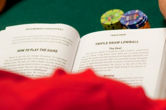Lyin�� and Truthin��: The Nancy Sinatra Rule of Poker

Last night I attended a concert by an up-and-coming band that I��ve only recently learned about, Harpeth Rising. They play mostly original music, but with a few covers mixed in. One of them was Nancy Sinatra��s hit from the 1960s, ��These Boots Are Made for Walking.��
I had not heard the song in a while, and I was reminded of its great line: ��You keep lyin�� when you oughta be truthin��.�� Which, of course, got me to thinking about the role of honesty and deception in poker. (The young women of Harpeth Rising are all poker players, incidentally.)
The 2009 movie The Invention of Lying posited a world like our own, with the key difference that it had never occurred to anybody to be anything less than fully honest. Its inhabitants are utterly without guile. They don��t even have a word for lying, because it is literally inconceivable �� that is, until the character played by Ricky Gervais discovers it. So much is everybody��s word trusted that he finds he can rip off a casino simply by telling the manager that a slot machine malfunctioned and didn��t pay his jackpot. The manager opens the vault, and gives Gervais the buckets of money he claims are due him.
In the background of the casino scene is what appears to be a poker table with several people playing. Unfortunately, the film didn��t explore this possibility, but take a minute to imagine how poker would work in a world in which it is not possible to be deceptive in any manner.
One of my standard poker-table jokes is this: When somebody bluffs me and shows it, I sometimes say, ��Hey, I thought there was a house rule that all bets have to accurately represent the strength of your hand.�� It always gets a laugh, because everybody recognizes intuitively that poker makes no sense as a game without deception.
Maybe people in the world of The Invention of Lying would go even further, and have poker played with everybody��s cards face up. The only skill left in the game would be matching the money invested to the probability of a given hand winding up the winner. There would be no point to a betting round after the river card was dealt. Slow playing would be unprofitable. Bluffing would be impossible. As Mike Matusow once observed, ��If you can��t steal, it ain��t poker.��
Conversely, though, imagine a poker player who was always as deceptive as possible. Every bet would be a bluff, every check a sandbag. This would fail miserably. Even the most novice player would quickly discern this pattern and exploit it mercilessly.
Successful poker, then, requires some sort of balance between actions �� betting, raising, checking, folding �� that accurately represent the strength of one��s hand, and those that do not. Indeed, an argument can be made that the fundamental skill that determines one��s profit in a given poker game is concocting the mix of straightforwardness and deception that is optimal for the specific opponents one is facing.
Mike Caro once wrote a great column about the proper role of deception in poker.
��In poker deception isn��t usually a direct means of generating profit,�� Caro explained. ��Think of deception as often being an expense, like advertising when you��re trying to build your business.... You need to understand that, in most cases, you��ll make the biggest profit by choosing the obvious straightforward play. That��s why it is the recommended play.��
As such, Caro maintains that ��Whenever you stray from that first choice, you��d better have a good reason. And that reason must not be simply to deceive. Deception has no value by itself; it must lead to profit. Now here��s the secret: In poker your entire quest should be to play straightforwardly as much as possible. That��s where the money is �� in making the decisions that are the most obvious, assuming you fully understand the situation.��
Bottom line, says Caro, is ��Don��t use deception unless the situation screams for it. Not because it��s been a long time since you did it. Not because you feel inspired. Not because you want to gloat. Not because it��s fun. Never use deception without a clearly profitable motive.��
I��m not entirely convinced that Caro is right that one��s ��entire quest should be to play straightforward as much as possible.�� However, I��m certain he��s correct to say that every deceptive move should have ��a clearly profitable motive.��
Are you bluffing on fifth street simply because you missed your draw and you have no other way to win the pot? Sorry, that��s not a good enough reason. You must also evaluate the probability of the bluff being successful, how much you stand to win, and with what frequency. And that, in turn, requires a solid grasp of basic poker math plus a good read on the calling tendencies of the opponent(s) left in the hand.
Do you habitually check your flopped sets, in order to check-raise or induce a bet on the next street? If so, knock it off! Your default choice should be a bet or raise when you think you have the strongest hand, which a flopped set will usually be. In order for deviating from this to be correct, there needs to be something about the situation that will make the deceptive choice more profitable than the straightforward one. Of course, many such situations exist. But you need to be able to articulate to yourself why this particular set of circumstances makes slow playing higher in expected value than playing it straight.
Or, to bring it back full circle, don��t be lyin�� when you oughta be truthin��, and don��t keep losing when you oughta not bet.
(For the Harpeth Rising version of Nancy Sinatra��s biggest hit, see here.)
Robert Woolley lives in Asheville, NC. He spent several years in Las Vegas and chronicled his life in poker on the ��Poker Grump�� blog.
Want to stay atop all the latest in the poker world? If so, make sure to get PokerNews updates on your social media outlets. Follow us on Twitter and find us on both Facebook and Google+!









